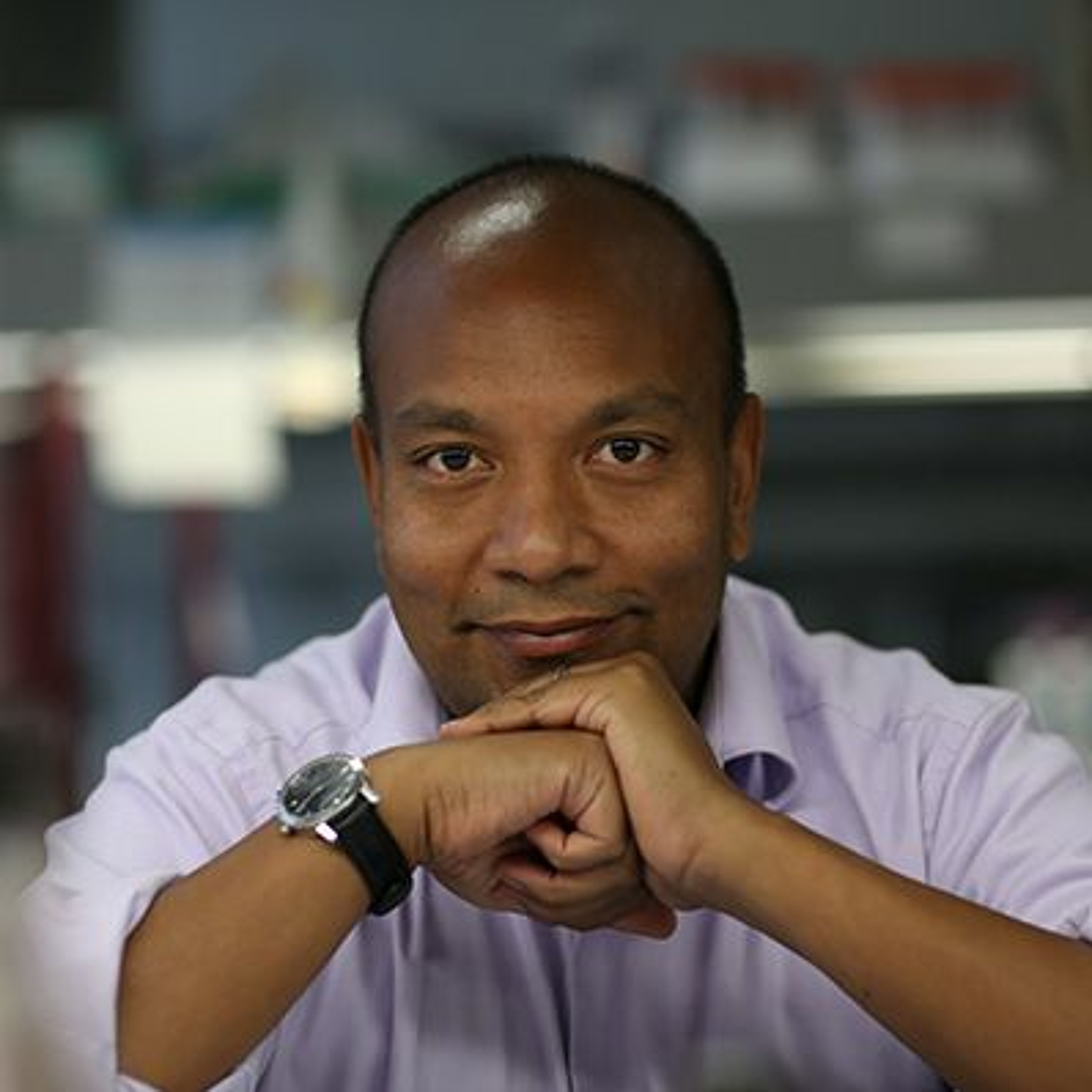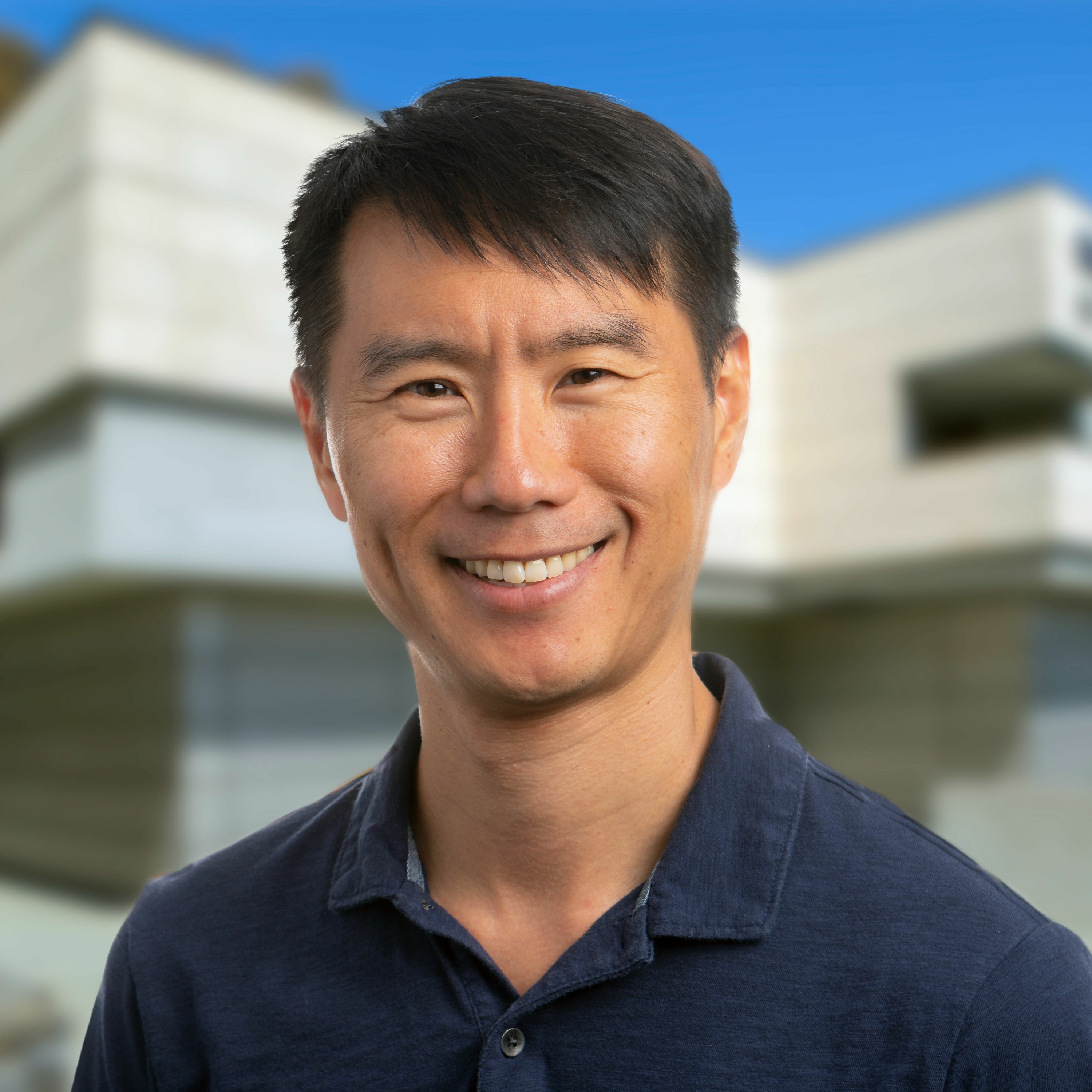Discover Science Changing Life
Science Changing Life

Science Changing Life
Author: Scripps Research
Subscribed: 32Played: 263Subscribe
Share
© All rights reserved
Description
This award-winning podcast brings Scripps Research discoveries to life, exploring the personal stories of the people behind the science on their quest to solve humanity’s biggest biomedical problems.
Follow us on social media for more updates:
@scrippsresearch on Twitter and Instagram
@ScrippsResearchInstitute on Facebook
Scripps Research on LinkedIn
Follow us on social media for more updates:
@scrippsresearch on Twitter and Instagram
@ScrippsResearchInstitute on Facebook
Scripps Research on LinkedIn
45 Episodes
Reverse
Donna Blackmond never thought her career would lead to solving how life first formed on the prebiotic Earth. But as she points out in this episode of Science Changing Life, does any scientist start out knowing where their research will take them? Blackmond, who is a professor and the John C. Martin Endowed Chair in Chemistry at Scripps Research, shares how her wide-ranging background across chemistry and chemical engineering is helping answer some of today’s biggest questions in science and medicine.
Episode transcript: https://www.scripps.edu/_files/images/2024_images/donna-blackmond-podcast-episode-45-transcript.pdf
Blackmond Lab: https://www.scripps.edu/blackmond/
Blackmond’s recent PNAS and Nature papers: https://www.scripps.edu/news-and-events/press-room/2024/20240228-blackmond-molecules.html
Scripps Research centennial: 100.scripps.edu/
Scripps Research Magazine: magazine.scripps.edu/
Dr. Jay Pandit is a director of digital medicine at the Scripps Research Translational Institute and an assistant professor in the Department of Molecular Medicine at Scripps Research, where he combines medicine and technology to improve patients’ clinical outcomes. Listen in as we explore how biosensors and wearable technologies are enabling users to take control of their own health data and usher in a new era of personalized medicine.
Episode transcript: https://www.scripps.edu/_files/images/2024_images/jay-pandit-transcript.pdf
X: https://twitter.com/JayPandit
LinkedIn: www.linkedin.com/in/jay-pandit-9489008
Scripps Research centennial: https://100.scripps.edu/
Scripps Research Magazine: https://magazine.scripps.edu/
Ahmed Badran is an assistant professor of chemistry at Scripps Research, where his lab harnesses synthetic biology to address some of biggest global problems. Listen in as we discuss reengineering plant enzymes to capture carbon, plastic-eating bacteria and new classes of antibiotics that spare our gut microbiome.
Episode transcript: https://www.scripps.edu/_files/images/2023_images/ahmed-badran-transcript.pdf
Badran lab website
https://badranlab.com/
Twitter
@AhmedHBadran
Scripps Research Magazine
https://magazine.scripps.edu/
Professor Mia Huang is based in the Department of Molecular Medicine at Scripps Research, where her lab explores how vital sugar molecules in the body orchestrate complex biological events. Listen in as we discuss deciphering cancer cell signals to develop new therapies, engineering red blood cells for transfusions and how to become a master of strategy.
Episode transcript: https://www.scripps.edu/_files/images/2023_images/mia-huang-transcript.pdf
Huang lab website
https://www.huangresearch.com/
Q&A with Mia
https://magazine.scripps.edu/profiles/2020/fall/science-with-a-view-understanding-how-natures-biomolecules-tick-with-mia-huang/
Twitter
@HuangMia
Scripps Research Magazine
https://magazine.scripps.edu/
Professor Ram Krishnamurthy is based in the Department of Chemistry at Scripps Research, where his lab investigates the reactions that could have first given way to life on Earth. Listen as we discuss finding biological building blocks on meteorites, NASA’s search for life on other planets, and staying grounded with philosophy and meditation.
Episode transcript
https://www.scripps.edu/_files/images/2023_images/ram-krishnamurthy-transcript.pdf
Ram’s faculty profile
https://www.scripps.edu/faculty/krishnamurthy/
Astrobiology at NASA
https://astrobiology.nasa.gov/news/new-nasa-research-consortium-to-tackle-lifes-origins/
Scripps Research Magazine
https://magazine.scripps.edu/
Professor Sumit Chanda is an infectious disease expert and immunologist, where he works both in the Department of Immunology and Microbiology and at Calibr, Scripps Research’s nonprofit drug discovery and development division. He has devoted his career to understanding how the immune system responds to numerous viruses, such as influenza, Dengue virus and SARS-CoV-2. Listen as we discuss everything from pandemic preparedness to drug discovery, as well as his unrelenting drive to uncover new treatment options—including for COVID-19.
Episode transcript
https://www.scripps.edu/_files/images/2023_images/sumit-chanda-transcript.pdf
Infectious disease sleuth Sumit Chanda, PhD, joins Scripps Research and its Calibr drug discovery division
https://www.scripps.edu/news-and-events/press-room/2021/20210915-chanda-calibr.html
Center for Antiviral Medicines & Pandemic Preparedness
https://www.campp.org/
Chanda lab website
https://linktr.ee/thechandalab
Twitter/Instagram
@thechandalab
Professor Ali Torkamani is the Director of Genome Informatics at the Scripps Research Translational Institute, where his team mines population-level genetic data to make predictions about future disease risk. Listen in as we discuss smartphone apps that could help predict the risk of a heart attack, the addition of genetic data to biosensors of the future and the use of video games as an introduction to data science.
Show notes:
Episode transcript: coming soon….
MyGeneRank app
https://mygenerank.scripps.edu/
Ali’s faculty profile
https://www.scripps.edu/faculty/torkamani/
Twitter
@ATorkamani
Scripps Research Magazine
https://magazine.scripps.edu/
Are the mitochondria truly the powerhouses of the cell? In this episode, assistant professor Danielle Grotjahn shares why she thinks “the stress sensors of the cell” may be a more appropriate name for this cellular organelle–and more. Dr. Grotjahn works in the Department of Integrative Structural and Computational Biology at Scripps Research, where her lab is answering how mitochondrial networks change shape in response to genetic, pharmacological or environmental stress. Listen as we talk about the links between mitochondrial dysfunction and disease, cell death, and the cutting-edge imaging technologies that are enabling Grotjahn and her team to peer into the mysteries of the mitochondria.
Show notes:
Episode transcript: https://www.scripps.edu/_files/images/2023_images/danielle-grotjahn-transcript.pdf
Grotjahn lab website
https://grotjahnlab.org/
Twitter
@nani_grotjahn
Scripps Research Magazine
https://magazine.scripps.edu/
Dr. Stuti Jaiswal is an assistant professor of molecular medicine at Scripps Research and an internist at Scripps Clinic. Listen in as we discuss the health issues associated with insufficient sleep, the best time to go to bed and what the latest wearables can tell us about our sleep patterns.
Show notes:
Episode transcript: https://www.scripps.edu/_files/images/2023_images/stuti-jaiswal-transcript.pdf
REFRESH sleep study at Scripps Research
https://refresh.scripps.edu/
The Digital Trials Center current research
https://digitaltrials.scripps.edu/about/
Scripps Research Magazine
https://magazine.scripps.edu/
Dr. Evert Njomen is a postdoctoral researcher in the lab of Professor Ben Cravatt, based in the Department of Chemistry. Listen as we talk about the autophagy process to cleanse cells, new ways of dealing with antibiotic resistance and cooking with homegrown herbs.
Show notes:
Episode transcript: https://www.scripps.edu/_files/images/2022_images/podcast-images/Evert-Njomen-transcript.pdf
Evert awarded prestigious fellowship from the Howard Hughes Medical Institute
https://www.scripps.edu/news-and-events/press-room/2021/20210304-njomen-howard-hughes-medical-institute-fellowship.html
Cravatt lab website
https://www.scripps.edu/cravatt/index.html
Tweet @EvertNjomen
Explore the Scripps Research Magazine
https://magazine.scripps.edu/
Subscribe to receive our monthly e-newsletter
https://signup.e2ma.net/signup/1879047/1890109/
@scrippsresearch on Twitter
Professor Andrew Su is based in the Department of Integrative Structural and Computational Biology, where his lab develops digital tools to draw conclusions from the vast streams of medical data generated each day. Listen to us discuss gaming as a way of being a scientist, the replacement of doctors with machine-learning and your Netflix watching history.
Show notes:
Episode transcript: https://www.scripps.edu/_files/images/2022_images/podcast-images/Andrew-Su-transcript.pdf
Andrew’s TEDx talk: Building the knowledgebase of biology using citizen science
https://www.youtube.com/watch?v=hT_pj1cB0Q8
Su lab website
https://sulab.org/
Tweet: @andrewsu
Citizen science initiatives:
https://www.zooniverse.org/
https://fold.it/
https://stallcatchers.com/main
Explore the Scripps Research Magazine
https://magazine.scripps.edu/
Subscribe to receive our monthly e-newsletter
https://signup.e2ma.net/signup/1879047/1890109/
@scrippsresearch on Twitter
Dr. Travis Young is the Vice President of Biologics at Calibr, the drug discovery and development division of Scripps Research. Travis and the team have created a new type of immunotherapy called “switchable” chimeric antigen receptor (CAR) T-cell therapy, which is already delivering precise and powerful therapies to patients with the most difficult to treat cancers. Listen as we talk about reengineering an individual’s immune T cells, promising clinical trials in leukemia and lymphoma patients, and using similar approaches to treat autoimmune diseases.
Show notes:
Episode transcript: https://www.scripps.edu/_files/images/2022_images/podcast-images/Travis-Young-transcript.pdf
Travis and his colleagues discuss ongoing therapies being developed at Calibr during the Front Row lecture series
https://www.youtube.com/watch?v=WRzQniqUlHo&t=2625s
Preliminary results of switchable CAR-T cells in lymphoma patients
https://www.scripps.edu/news-and-events/press-room/2021/20211208-calibr-announces-clinical-data-car-t-cells.html
Tweet: @CARTCellTherapy
Explore the Scripps Research Magazine
https://magazine.scripps.edu/
Subscribe to receive our monthly e-newsletter
https://signup.e2ma.net/signup/1879047/1890109/
@scrippsresearch on Twitter
Part three of our mini-series centered on brain health. Professor Frederick Barrett is based in the Department of Psychological & Brain Sciences at Johns Hopkins School of Medicine and Associate Director at the Center for Psychedelic and Consciousness Research. Fred and his colleagues investigate the therapeutic effects of psychoactive substances in intractable patient populations, including those with depression, opioid use disorder and cognitive impairments. Listen as we talk about the different types of hallucinogenic mushrooms, whether psychedelics could one day treat neurodegeneration and the remedial value of a bad “trip.”
Show notes:
Episode transcript: https://www.scripps.edu/_files/images/2022_images/podcast-images/Frederick-Barrett-transcript.pdf
Fred’s TEDMED talk: The neuroscience of psychedelic drugs, music and nostalgia
https://www.ted.com/talks/frederick_streeter_barrett_the_neuroscience_of_psychedelic_drugs_music_and_nostalgia?language=en
Center for Psychedelics and Consciousness Research
https://hopkinspsychedelic.org/barrett
Tweet: @FredBarrettPhD
Explore the Scripps Research Magazine
https://magazine.scripps.edu/
Subscribe to receive our monthly e-newsletter
https://signup.e2ma.net/signup/1879047/1890109/
@scrippsresearch on Twitter
The second part of our three-part mini-series on brain health. Professor Ryan Shenvi is based in the Department of Chemistry at Scripps Research, where his lab reconstructs useful molecules typically found in remote corners of the world. Listen as we talk about traditional remedies of indigenous cultures, formulating medicines from industrial waste and Charles Dickens’ drinking habits.
Show notes:
Episode transcript: https://www.scripps.edu/_files/images/2022_images/podcast-images/Ryan-Shenvi-transcript.pdf
Shenvi finds a quick way to synthesize novel neuroactive compounds found in rainforest tree
https://www.scripps.edu/news-and-events/press-room/2022/20220317-shenvi-neuroactive-compounds-in-rainforest-tree.html
Q&A with Ryan
https://magazine.scripps.edu/profiles/2022/online-exclusive/channeling-ethnomedicine-to-address-mental-health/
Shenvi lab website
https://www.shenvilab.org/
Tweet: @Shenvi_Lab
Explore the Scripps Research Magazine
https://magazine.scripps.edu/
Subscribe to receive our monthly e-newsletter
https://signup.e2ma.net/signup/1879047/1890109/
@scrippsresearch on Twitter
We kick off the Summer 2022 podcast season with the first of a three-part mini-series dedicated to brain health. Professor Sandra Encalada is based in the Department of Molecular Medicine at Scripps Research, where her lab investigates the transport of cargo within brain cells and its role in health and disease. Listen as we talk about new therapeutic agents to stop and reverse neurodegeneration, environmental neurotoxins and when to listen to your gut feeling.
Show notes:
Episode transcript: https://www.scripps.edu/_files/images/2022_images/podcast-images/Sandra-Encalada-transcript.pdf
Encalada illuminates how brain cells die in prion diseases
https://www.scripps.edu/news-and-events/press-room/2021/20211222-encalada-brain-cells-prion-diseases.html
Encalada lab website
https://www.encalada.scripps.edu/
Tweet: @EncaladaLab
Explore the Scripps Research Magazine
https://magazine.scripps.edu/
Subscribe to receive our monthly e-newsletter
https://signup.e2ma.net/signup/1879047/1890109/
The fifth and final episode in our healthy aging series. We discover what happens inside the cell with age and how new chemical tools are leading us towards ways of repairing the damage and preserving our youth.
This article is taken from the Summer 2021 of our award-winning Scripps Research Magazine.
Show notes:
Explore the Scripps Research Magazine
https://magazine.scripps.edu/
The fourth segment of our series on healthy aging. We take a look at how breakthroughs in chemistry have enabled the rational design of therapies that can stop or slow complex diseases of the heart and nervous system.
This article is taken from the Summer 2021 of our award-winning Scripps Research Magazine.
Show notes:
Explore the Scripps Research Magazine
https://magazine.scripps.edu/
We roll on with part 3 of our healthy aging series. We examine the role of our DNA blueprint in the risk of cardiovascular disease, as well as how understanding our personal genetic risk scores could help us avoid that deadly heart attack.
This article is taken from the Summer 2021 of our award-winning Scripps Research Magazine.
Show notes:
Explore the Scripps Research Magazine
https://magazine.scripps.edu/
In the second of this series on healthy aging, we reveal how Scripps Research scientists are developing interventions to remove stiff, achy joints from the aging equation.
This article is taken from the Summer 2021 of our award-winning Scripps Research Magazine.
Show notes:
Explore the Scripps Research Magazine
https://magazine.scripps.edu/
Peer into the future of healthy aging. In this episode (the first of a 5-part series), we shed new light on how our cells and organs work together to influence longevity, and how newly discovered molecules may be able to block biological degeneration.
This article is taken from the Summer 2021 of our award-winning Scripps Research Magazine.
Show notes:
Explore the Scripps Research Magazine
https://magazine.scripps.edu/
























